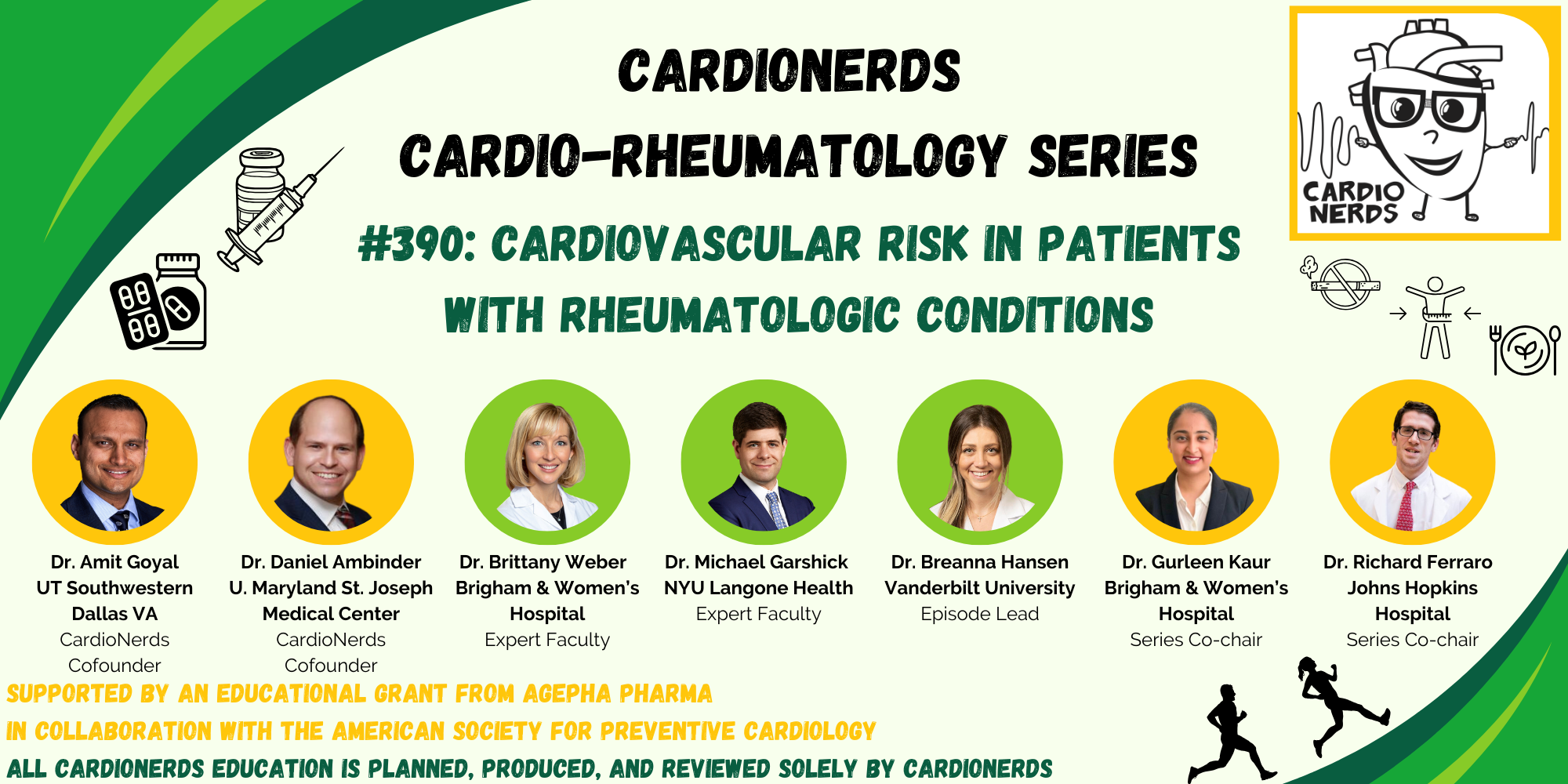
 Cardionerds: A Cardiology Podcast
Cardionerds: A Cardiology Podcast 390. Cardio-Rheumatology: Deciphering Cardiovascular Risk in Patients with Rheumatologic Conditions with Dr. Brittany Weber and Dr. Michael Garshick
CardioNerds Cardio-Rheumatology Series Co-Chairs Dr. Rick Ferraro, Dr. Gurleen Kaur, and and Dr. Bree Hansen discuss how to decipher cardiovascular risk in patients with rheumatological conditions with cardio-rheumatology experts Dr. Brittany Weber and Dr. Michael Garshick.
In this episode, Drs. Weber and Garshick take us through the role of inflammation in patients with rheumatologic conditions and cardiovascular disease. They discuss the increased prevalence of traditional cardiac risk factors in this population and how these standard cardiac risk factors do not account for the full extent of cardiovascular risk. Dr. Bree Hansen drafted show notes. Audio editing by CardioNerds intern Christiana Dangas.
US Cardiology Review is now the official journal of CardioNerds! Submit your manuscript here.
This episode is supported by the 5th Annual Going Back to the Heart of Cardiology (A MedscapeLIVE Conference). Join co-chairs Dr. Robert Harrington and Dr. Fatima Rodriguez January 24-26, 2025 at the Fontainebleau Hotel in Miami Beach, Florida.
The agenda will explore the latest advancements in cardiology including cardiovascular prevention, atherosclerosis and thrombosis, cardiovascular dysfunction, arrhythmias, and valvular heart disease. Network, attend engaging presentations by renowned cardiologists, visit the exhibit and poster hall, participate in an exclusive immersive experience, and earn up to 13 CME/CE credits.
Register today with code CARDIONERDS for 30% OFF your registration. Click here for more information.


Pearls – Cardio-Rheumatology – Deciphering Cardiovascular Risk in Patients with Rheumatological Conditions
- Cardiovascular disease prevalence: cardiovascular disease is common in patients with autoimmune rheumatologic disease; therefore, we must take every opportunity to screen patients early.
- Limitations of Traditional Scores: conventional risk calculators often underestimate cardiovascular risk for autoimmune disease patients, necessitating additional methods to assess risk accurately.
- Integration of Disease-Specific Biomarkers: using biomarkers specific to autoimmune diseases, such as lupus, enhances risk assessment and helps in tailoring treatment strategies.
- Value of Imaging and Risk Enhancers: incorporating imaging (like CAC scoring and carotid ultrasound) and evaluating additional risk factors (such as lipoprotein(a) and high-sensitivity CRP) provides a more comprehensive view of cardiovascular risk and guides more effective management.
Show notes – Cardio-Rheumatology – Deciphering Cardiovascular Risk in Patients with Rheumatological Conditions
Show notes (Drafted by Dr. Bree Hansen):
How does inflammation contribute to atherosclerosis, specifically in autoimmune rheumatologic diseases like psoriasis?
- Lipids need to enter the intimal space of blood vessels, which can be facilitated by endothelial damage caused by chronic cytokine stimulation, such as TNF or IL-6. Once in the intima, lipids are recognized as foreign, leading to the recruitment of monocytes that transform into macrophages to clear these lipids. However, this process often exacerbates the problem, leading to persistent inflammation and atherosclerotic plaque formation.
- Specifically, in psoriasis, the endothelial damage is particularly pronounced due to cytokines like TNF, IL-17, and interferons. The inflammasome pathway, which is highly active in psoriasis, also contributes to endothelial damage. Additionally, hyperactivated platelets in psoriasis can further damage the endothelium and contribute to atherosclerosis.
- Overall, atherosclerosis results from a combination of traditional risk factors and systemic inflammation, leading to the development of cardiovascular disease.
Which traditional cardiovascular risk factors are increased in patients with rheumatologic conditions?
- Patients with autoimmune diseases may be up to > three times more likely to develop cardiovascular disease, similar to the risk of type 2 diabetes; therefore, it is important to screen patients with autoimmune rheumatologic disorders for cardiovascular disease
- Most common cardiovascular risk factors, such as smoking, diabetes, hypertension, and dyslipidemia, are also increased in patients with autoimmune rheumatologic disorders. Smoking, specifically, is highly prevalent in psoriasis and exhibits a dose-response relationship with psoriasis severity.
- Hyperlipidemia is another common risk factor present in patients with autoimmune rheumatologic disease; however, a “lipid paradox” also exists. The “lipid paradox,” where lower LDL (low-density lipoprotein) levels are associated with higher inflammation, seems counterintuitive since lower LDL is often thought to indicate lower cardiovascular risk. This paradox is particularly well-documented in rheumatoid arthritis (RA) but may apply to various other conditions as well. In clinical practice, it’s important to assess lipid levels not only during periods of high inflammation but also when the patient is in a state of disease remission or stability. This is because lipid levels can fluctuate based on the level of inflammation and the medications a patient takes, such as biologics.
How can cardiovascular disease risk be estimated in patients with rheumatologic conditions beyond that of traditional risk factor calculators?
- Traditional cardiovascular risk scores like the Framingham Risk Score and ACC/AHA Pool Cohort Equation often underestimate risk, particularly for patients with autoimmune diseases. Risk calculators in women with RA underestimated cardiovascular risk at least 2‐fold.
- The Run-On Risk Score includes inflammatory markers like CRP but can still fall short in risk assessment. While some specialized calculators like The British SCORE2 system, which initially included rheumatoid arthritis (RA), and later QRISK3, which added lupus and steroid use, include these autoimmune conditions, no standard tool is universally applied for these diseases. Therefore, clinicians need to integrate multiple data sources to assess risk effectively
- Recent research, such as a study from Dr. Weber’s group, has highlighted that incorporating lupus-specific biomarkers such as persistently positive double-stranded DNA, low complement levels, and lupus anticoagulant into risk calculators improves risk prediction for lupus patients.
- Thus, beyond traditional risk factors, clinicians should assess disease duration, activity biomarkers, and the impact of treatments (including medications like hydroxychloroquine that have potential cardiotoxicity). Clinicians should also use other risk enhancers, like lipoprotein(a) and high-sensitivity CRP, and consider imaging techniques like coronary artery calcium (CAC) scoring to evaluate atherosclerotic burden. Elevated lipoprotein(a) levels and high CAC scores indicate higher risk, even if traditional risk scores suggest otherwise.
